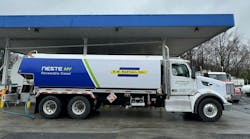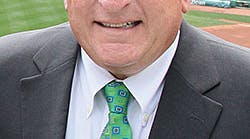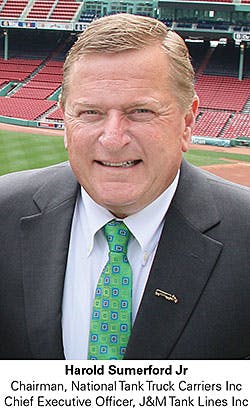FOR Harold Sumerford, his year as 2015/2016 chairman of National Tank Truck Carriers was anything but routine or boring. The association and its leadership had to contend with a tidal wave of regulatory changes from the federal government, economic challenges, and more organizational changes designed to strengthen NTTC.
Economic issues facing the tank truck sector included the steep drop in oil prices that idled drilling rigs across the United States. Tank truck fleets serving the oilfield suffered with the rest of the service sector.
Regulatory issues definitely trumped the economy, and probably the most challenging regulatory event started as a trucking association-supported effort to protect the hours-of-service 34-hour restart rule with no additional restrictions. Language protecting the 34-hour restart was written into the highway funding bill, called the “Fixing America’s Surface Transportation Act” by Congress.
Excitement over passage of the FAST Act faded quickly when it was revealed that a critical mistake was made in the 34-hour restart rule revision. Department of Transportation officials announced that the provision written into the FAST Act actually eliminated the 34-hour restart in its entirety. Without a fix, the hours of service rules will revert to those in place in 2003. Congress seems to have no appetite for revisiting the issue at this time.
The American Trucking Associations seems to have decided to shift its attention to federal preemption issues at the expense of the 34-hour-restart provision. This has not sat well with Sumerford and others at NTTC.
Other regulatory activity over the past year (both good and bad) included the electronic logging device mandate, a Congressional bar on rulemakings that would ban wetlines, a reduction in random drug testing rates, a proposed safety fitness rule for motor carriers, and proposed training standards for entry-level truck drivers.
Regulatory changes actually are nothing new for Sumerford, chief executive officer of J&M Tank Lines Inc, Birmingham, Alabama. Founded in 1948 in Selma, Alabama, the company was based in Americus, Georgia for many years before moving back to Alabama in 2007.
Sumerford’s father, Harold Sumerford Sr, joined the company in 1960, and the business took off at that time. Over the years, the carrier had diversified operations that included dry bulkers, liquid tanks, flatbeds, and vans and reefer trailers.
Today, the family-owned carrier is focused overwhelmingly on dry bulk hauling, particularly industrial products. The carrier made a significant expansion into the Texas oil and gas shale plays—primarily hauling frac sand—during the boom times.
Sumerford learned the trucking business from his father. “I grew up in the business like a lot of others at the old line trucking companies,” he says. “My father took me to a lot of the ICC (Interstate Commerce Commission) hearings. He would take me to sales meetings. I enjoyed all of that. It really gets in your blood. I learned to drive at a very young age and still have a valid CDL.”
He started working in the company at a relatively young age (13-16 years old). “I was mowing the grass at the terminal and picking up trash,” he says. “We had a flatbed operation, and I would pull nails out of the runners on the trailers. As I got older, I moved up to servicing trailers and tractors. I think family-owned carriers can still bring their children into the business that way. However, we do have more government oversight today.”
He gradually worked his way into the office—handling the safety department, driver logs, and such. “I never really thought about doing anything else,” he says. “After high school, I was headed to the University of Tennessee initially to become an ICC attorney or ICC practitioner when trucking industry deregulation occurred. It was clear that my field trip to Knoxville, Tennessee was a waste of time. Instead, I went to Georgia State University to study business, which worked well because we had about three terminals in Atlanta at that time and I could continue working for the company.”
Sumerford joined the family business fulltime in 1978. He left temporarily in 1990 to pursue another business opportunity.
“I already had a hazardous waste transportation company, and I started an industrial waste processing plant that handled roll-offs and van trailers,” he says. “I handled hazardous and non-hazardous waste but I preferred the non haz because it was economically more attractive.”
Sumerford returned to J&M Companies in 1998 when his father said he wanted to begin planning for retirement.
“His philosophy was for us to run the company while he sat back and watched,” he says. “If he saw us screwing up, he would get us back into line. He told us that the other alternative was that he could continue running the whole operation until the day he died and then we would end up with a business we didn’t know how to run.”
In 2002, Harold Sumerford Sr officially retired, but he still spent about 20 hours a week involved in the company. By 2012, he was just coming by the office occasionally. In 2014, he sold all of the business to his two sons.
“By then, he was extremely pleased with the way the company was being run,” Sumerford says.
Through Harold Sumerford Sr, J&M Tank Lines became involved in NTTC in the early 1980s. The Sumerfords were the eighth father-son pair to serve as NTTC chairmen. Harold Sumerford Sr held the position for the 2002/2003 term.
“My father always thought highly of the organization,” Sumerford says. “I was focused on running the truck fleet and didn’t attend my first meeting until around 1988. My attendance was sporadic at first and I did not become consistently involved until after 2000.”
Becoming involved in NTTC has been very rewarding for Sumerford. “I had a good year as NTTC chairman,” he says. “I did learn that things move at a different pace in Washington than they do in the business world. In the trucking sector, we’re running wide open all the time, and our existence depends on being successful in accomplishing positive results.
“We’re doing a lot of good things at NTTC. As the personnel changes we’ve made fall into place, we are seeing a significant improvement in member services. We’ve worked closely with Dan Furth (NTTC president) on that. We have a lot of great programs in place now, and more are coming.”
During a recent interview with Bulk Transporter, Sumerford reviewed the challenges faced by the tank truck industry over the past year and the steps being taken by NTTC to give members the tools they need to handle those challenges.
BT: What will the 2016 presidential election mean for the tank truck industry?
Sumerford: Let’s just say that in worst case (Senator) Bernie (Sanders) or (former Secretary of State) Hillary (Clinton) get elected. We’re not going out of business. We’ll just have to roll up our sleeves and figure out how to continue making a living.
BT: How would you characterize the state of the tank truck industry?
Sumerford: I believe the industry is doing better today. I think the tank truck industry—with the exception of the energy sector—is doing well. We have some real smart company executives out there. It’s not easy for just anyone to get into our industry.
BT: How does the tank truck sector compare with the rest of the trucking industry?
Sumerford: We tend to have complementary economic cycles. A friend in the van business tells me that when we are very busy he knows his loads will pick up very soon. We haul the materials to go into the manufactured products that the van carriers transport. When we start slowing down, they will see a slowdown soon.
I think we have a somewhat easier time with drivers than the rest of trucking. I think our drivers feel like they are more part of a family even in the bigger companies. Our operations are more specialized and require more attention to detail. We have more support personnel per driver.
At J&M Tank Lines, we set up a central dispatch a few years ago, but we eventually had to put driver representatives back into some of the terminals. We had to maintain a closer relationship to the drivers.
BT: What is happening in the oilfield today for tank truck carriers?
Sumerford: It has been very bad. At J&M, we were fortunate to put away money during the good times so we would be prepared for an eventual downturn. We had no idea when it would happen, but we are glad we put away the money.
We have extremely low mileage trucks parked in Cleburne, Texas, with batteries disconnected, fuel drained, and windshields covered up. We’ll let them sit for the next year or so while the market is still down.
We believe the oilfield is coming back, and we’re waiting. We still have our oilfield relationships.
BT: Do you still have trucks working in the oilfield?
Sumerford: Yes, but we are down about 60%. We were running about 140 trucks last year in the Texas oilfield. We have about 45 trucks in oilfield service today.
BT: How do you feel about the repeal of the ban on US crude oil exports?
Sumerford: At the end of the day, it will be very positive for the United States. It will enable US oil producers to find the best prices for their product.
BT: Is there excess capacity in the tank truck industry today?
Sumerford: There is some excess capacity but not as much as in other trucking sectors. There are loads out there to be hauled, but we’re seeing downward movement on rates.
That is especially true in dry bulk. There are too many dry bulk trailers in the market now due to the oilfield downturn. On the liquid side, it still looks like shippers are looking for tanks, and we are seeing requests for quotes on loads.
BT: How is the driver supply for tank truck carriers?
Sumerford: We’re not seeing any real shortage of drivers. With that said, however, there is a huge shortage of very good drivers. Back in the 1980s, we called a par driver a “steering wheel holder.” Today, I would love to have a fleet of them. Our driver turnover at J&M Tank Lines is relatively low, and our average driver age is dropping somewhat.
BT: What is happening with regard to merger and acquisition activity in the tank truck industry?
Sumerford: We’re seeing a little bit of activity but not the big deals. I don’t think buyers and sellers are in sync on valuations and EBITDA right now.
We’re seeing a fair amount of used equipment for sale, but much of it is priced higher than we want to pay. Too many people bought dry bulkers and tank trailers when the demand was hot and the equipment was bringing top dollar.
BT: What was the biggest regulatory issue for the tank truck industry during your term as NTTC chairman?
Sumerford: That would have to be the debacle over driver hours of service and the F4A federal preemption issues. For NTTC, the key factor is determining which is the bigger priority. We need to take a stand for our members. I think they want to know where the association stands.
Preemption is a bigger immediate issue for bigger carriers, but it will eventually impact even the smaller carriers that make up much of NTTC’s membership. The HOS restart issue will affect everybody as soon as it rolls back maximum weekly driving hours to 2003 levels.
BT: When would the hours-of-service roll-back occur?
Sumerford: That’s a good question. The Department of Transportation has to release a study on the impact of the regulation as related to hours of service. We understand they have the study but they haven’t released it. We suspect they haven’t because it is favorable to trucking.
It is very important that NTTC take a stand. We can’t just grab onto the coat tails of other organizations. We can’t follow along like a puppy dog. We can’t compromise on hours of service. It must be a priority.
BT: Would you consider the Congressional halt to wetlines rulemaking to be one of the biggest positives during your chairmanship?
Sumerford: We’re very happy, and this really showcased the value of NTTC’s lobbying efforts. Members of Congress who worked with us on this did a great job. Britton Clark of SBL Strategies was also instrumental in helping us achieve our goal. I think it is finally dead.
BT: What does the Federal Motor Carrier Safety Administration’s new safety fitness rule mean for the industry?
Sumerford: I’ll be quite interested in seeing what they come up with in the final rule.
BT: Are you happy with the mandatory removal of the carrier data from the FMCSA web site?
Sumerford: Our fleet had good numbers, and the only number that was a real issue was the data related to drivability of a truck following an accident. It was crazy. You would get dinged in the on-line data if your truck had to be towed after being hit by another driver. DOT would not bend on that. I had no problem with the other data—hours of service, maintenance, fitness, and such.
BT: Are you ready for the electronic driver log mandate?
Sumerford: J&M Tank Lines has been on electronic driver logs since 2009. We should have had a federal mandate 10 years ago. In my opinion, there is only one reason a shipper would use a trucking company that doesn’t run electronic logs. Electronic logs are cheaper to administer and supervise. I think the coercion rule along with electronic logs will increase safety and improve the quality of the driver’s life.
BT: Will FMCSA’s proposed entry-level driver training standards improve the process?
Sumerford: This is something we need. It should make it easier for us to hire people who really can drive a truck. We need rules that will add value for the people learning to drive a truck. We need to make sure we’re not just hiring someone to hold a steering wheel. I believe greater uniformity in training will attract more people to the industry.
BT: What would you say your core achievements were as chairman over the past year?
Sumerford: When I began my term as chairman, my chief goal was to develop consistency within NTTC year over year. We had that for many years. We’ve made a lot of changes over the past couple of years. We have a relatively new staff. We’re just trying to tweak the operation to get the best out of each person.
We now have a structural committee in place, and I feel confident that we probably will add a chief operating officer. We want to pull Dan Furth out of some of the day-to-day duties so he can focus on broader issues.
We solidified our advocacy efforts. We have improved our meeting agendas. The agenda we had for this year’s winter board meeting was very good, especially for the first day. We added a sales position and hired Ryan Streblow as senior vice-president of sales and marketing.
We started a weekly leadership call over the past year. Participants include Dan Furth, all of the vice-chairmen, the treasurer, the immediate past chairman, and the chairman. It is helping our new leadership get up to speed on industry and association issues.
BT: What was the purpose of the strategic review conducted during your term?
Sumerford: My objective with the strategic review was to bring our association leadership together for a day and a half to discuss association programs and goals. We want to build a commitment for the programs in the new leaders who are moving up through the ranks. We came out with a new mission statement and a more determined focus on advocacy.
BT: With all of the changes, what is the state of the association today?
Sumerford: The association is doing very well financially, and it is very important to understand that we are independent. That is very important. We can provide services for our members that are specific to our industry without outside influence. I think we are just beginning to figure out how important this is.
Our staff works exceptionally well within the budget constraints. We have the resources to do more important program, such as the Liquid Products Database. We need to beef up our educational efforts.
Our Political Action Committee is strong. Under Bill Usher, we’ve done a lot to build up the PAC. However, we still need to bring in more participants. We have to give them solid reasons to give more money, and I think issues like the hours-of-service debacle will help do that. ♦











